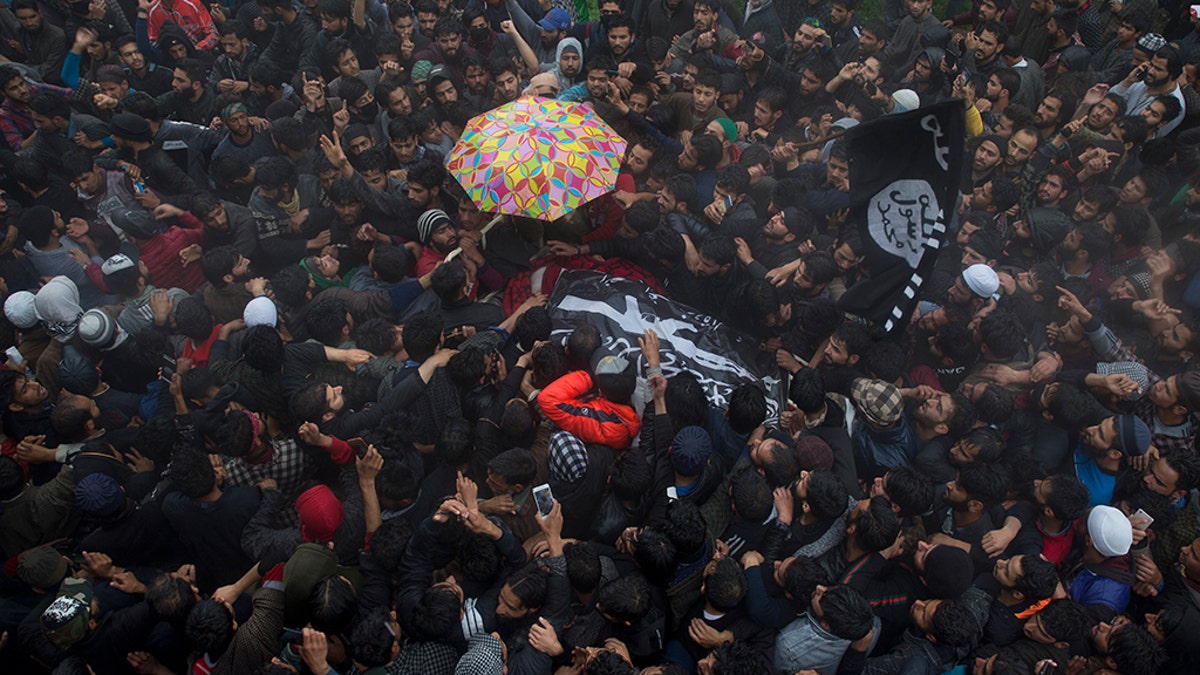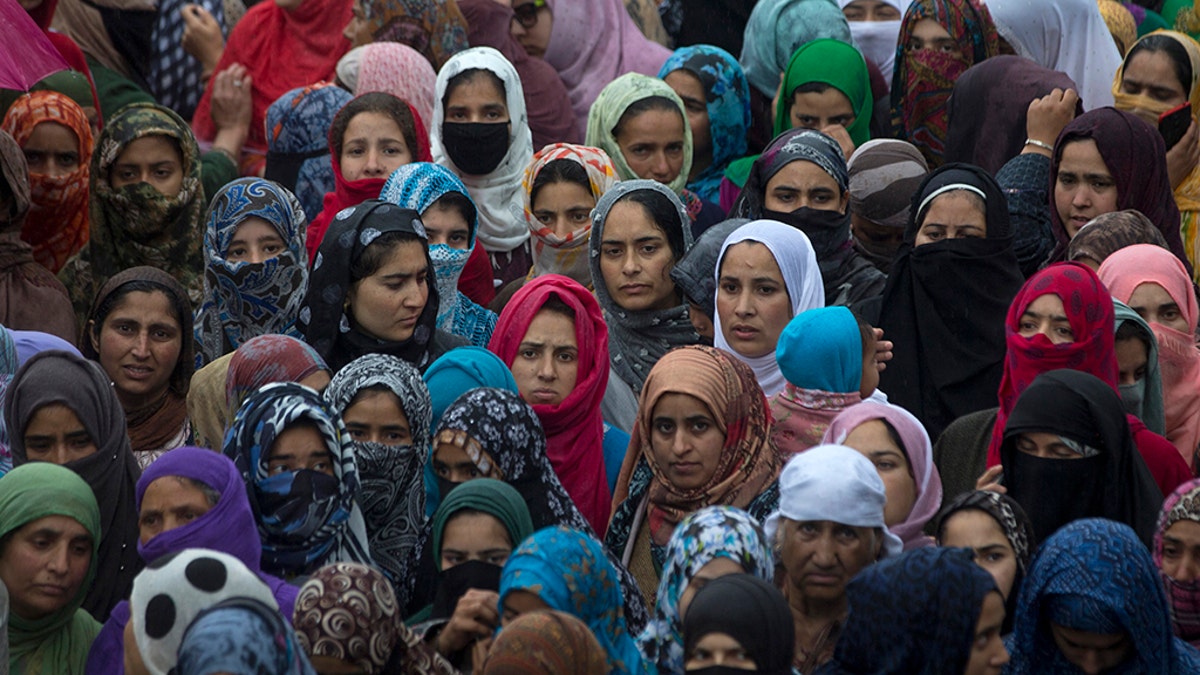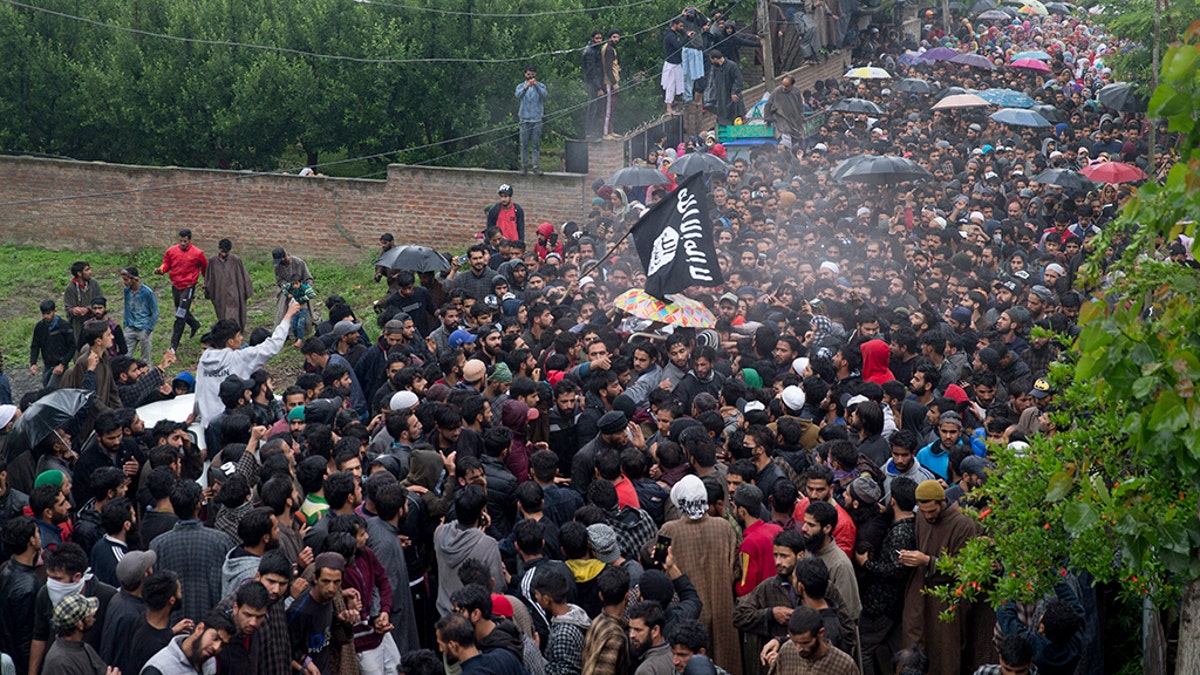Fox News Flash top headlines for May 24
Fox News Flash top headlines for May 24 are here. Check out what's clicking on Foxnews.com
Thousands of people on Friday came out to mourn the leaders of an Al Qaeda-linked militant group killed by Indian troops a day earlier in Kashmir.
Zakir Musa, described as "India's most wanted" militant, was shot dead after troops trapped him in a three-story house in the region's Tral district. He had refused to surrender and fired grenades at Indian police and troops after they zeroed in on his civilian hideout.
Musa, whose real name is Zakir Rashid Bhat, was a close aide of Burhan Wani, a charismatic Kashmiri militant whose 2016 killing by security forces sparked widespread protests.
INDIA POLICE ARREST KASHMIR ACTIVISTS AMID RISING TENSIONS

Kashmiri villagers carry the body of Zakir Musa, a top militant commander linked to al-Qaida, as it rains during his funeral procession in Tral, south of Srinagar, Indian controlled Kashmir, Friday, May 24, 2019. (AP Photo/Dar Yasin)
Local media are calling Musa's killing the "biggest victory" for the Indian armed forces since the death of Wani.
Similarly, Musa's death has already triggered angry anti-India protests in the Muslim-majority state, Kashmir-based journalist Sameer Yasir told the BBC.
Authorities had cut off the internet on cell phones to try to curb protests and discourage dissemination of protest videos. They also imposed a curfew across much of the Kashmir Valley, including the main city of Srinagar, and ordered schools and colleges to remain closed.

Kashmiri villagers watch the funeral procession of Zakir Musa, a top militant commander linked to al-Qaida, as it rains in Tral, south of Srinagar, Indian controlled Kashmir, Friday, May 24, 2019. (AP Photo/Dar Yasin)
INDIA AND PAKISTAN'S FIGHT OVER KASHMIR: A HISTORY OF VIOLENCE AND INSURGENCY
But neither the preventative measures nor the security lockdown or torrential rain stopped thousands of people from attending his funeral or gathering in protest.
Musa joined Kashmir's largest indigenous rebel group, Hizbul Mujahideen, in 2013 after dropping out of his engineering course.
But in mid-2017, an Al Qaeda-linked propaganda network said he became the head of an affiliated militant group, Ansar Ghawzat-ul-Hind, with less than a dozen others.
Musa regularly issued audio messages mainly stressing that Kashmir's struggle was for Islamic cause and had nothing to do with nationalism, highlighting a shift in ideology among some rebels in the region where militants have mainly fought for either independence of Indian-controlled Kashmir or merger with Pakistan.
He instantly became a media sensation, particularly with New Delhi-based television news channels using him to showcase that Kashmiri struggle for self-rule was part of a global militant agenda. Previously, no global jihadi groups have openly operated in Kashmir, a territory divided between India and Pakistan but claimed by both entirely. All Kashmir rebel groups rejected Musa and his Al Qaeda affiliate.

Kashmiri villagers carry the body of Zakir Musa, a top militant commander linked to al-Qaida, as it rains during his funeral procession in Tral, south of Srinagar, Indian controlled Kashmir, Friday, May 24, 2019. (AP Photo/Dar Yasin)
HUNTING AYMAN AL ZAWAHIRI: WHERE HAS THE AL QAEDA LEADER BEEN HIDING FOR 18 YEARS?
Separatist leaders, who challenge India's sovereignty over Kashmir, have repeatedly rejected the presence of outside groups, including Al Qaeda and have accused India of portraying the Kashmiri struggle as extremist. Musa was a close aide of Wani, whose killing in 2016 triggered open defiance against Indian rule.
Wani's death and the resulting public fury brought the armed rebellion into the mainstream in Kashmir and revived a militant movement that had withered in recent years to only about 100 fighters in scattered rebel outfits.
Officials say since Wani's killing, hundreds of young men have joined rebel ranks, some of them after stealing weapons from soldiers and police.
CLICK HERE FOR THE FOX NEWS APP
Wani's death also cemented a shift in public behavior, with people displaying anger at Indian rule openly and violently when troops raid villages to hunt rebels.Rebel groups have been fighting against Indian rule since 1989.
Nearly 70,000 people have been killed in the armed uprising and the ensuing Indian military crackdown.
The Associated Press contributed to this report.

